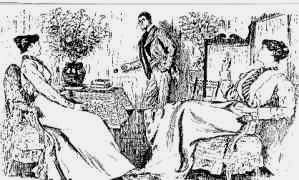
The new woman
'You're not leaving us, Jack?'
'Oh, I'm going for a cup of tea in the servants' hall.
I can't get on without female society, you know!'
Cartoon from Punch, 1895
The early students of the women's colleges were highly motivated women which was just as well since they met with a great deal of opposition from family and friends.
Louisa Lumsden, one of the early women students at Cambridge, had an unpleasant shock when she heard a clergyman say, 'Ha! This is Hitchin, and that I believe is the house where the College for Women is - that infidel place.'
Students were expected to behave with decorum when in public, to ensure that the reputation of their college did not suffer. Constance Maynard recalled that,
| ... The main idea in all these matters was to escape observation, and we were delighted with the verdict of a Cambridge lady who in some fear and trembling, had asked one of us to dine with her, and who then explained as an excuse to a friend, 'My dear, she was a nice girl, with nice rosy cheeks, nice manners, and nicely dressed, and you wouldn't have thought she knew anything.' Quoted in Felicity Hunt (ed.), Lessons for life. London, 1987, p. 183. |
Despite all the restrictions, nothing could dim twenty-three year old Constance Maynard's enthusiasm and joy as she
| ... used to wake every morning in my first term or two with a sort of sting of delight and think, 'Here is a whole day more at college.' Quoted in Felicity Hunt (ed.), Lessons for life. London, 1987, p. 172. |
Her parents were strong evangelicals who had carefully protected Constance and her five brothers and sisters from such worldly things as parties and novels. The first time she was allowed to travel alone was when she went to Scotland to spend her twenty-third birthday with her aunt. It was while there that she heard about Emily Davies's College for Women and immediately longed to be a student there:
|
It was a new world to me. I asked what 'Tripos' meant and how the students lived and a few other questions; and as we talked, a quiet suggestion arose in my heart as clear as a whisper from without. 'There, that is what you have been waiting for.' Aloud I said 'How interesting! How I would like to go!' - adding mentally in response to the voice, 'Yes, yes, I won't disobey my parents in the least thing, but oh I'll move heaven and earth to get there.' |
Her parents at first were very much against the idea, especially her mother who suspected that the new college would be very worldly. She relented eventually, asking Constance not to take up teaching or get any ideas of leaving home. Constance promised anything and everything to gain her mother's approval. She decided to study for the Moral Sciences Tripos and despite the difficulties involved gained this coveted goal.
The recollections of Constance Maynard suggest that most of these early women students were neither very radical nor very politically conscious in their views:
| The parliamentary suffrage was not much talked of in those days but 'Women's rights' were greatly discussed, and a reliable instinct guided us to the belief that the one right to be laboured for was the right to education, and that all else might follow as it would. Since the whole movement was young, we naturally had but indefinite aims, and yet what was lost in clearness of vision was made up in enthusiasm. Quoted in Felicity Hunt (ed.), Lessons for life. London, 1987, p. 182. |
In this the students, whether consciously or not, adopted the views held by many of the early leaders of the women's movement who saw education as the great liberating force for women and the key to their equality.
Even this moderate belief that women should study the same subjects as men, pass the same examinations and take up paid professional employment aroused a storm of protest because it challenged the very basis on which society was founded. As Jane Harrison's aunt put it,
| 'I do not see how Greek grammar is to help little Jane to keep house when she has a home of her own.' Jane Ellen Harrison, Alpha and Omega, London, 1915. Quoted in Felicity Hunt (ed.), Lessons for life. London, 1987, p. 184. |
A stereotyped image of the 'New Woman' soon mocked and ridiculed all those women aspiring to higher education.
|
There is a New Woman, and what do you think? |
|
|
| Queen's College, Harley St., London founded 1848 |